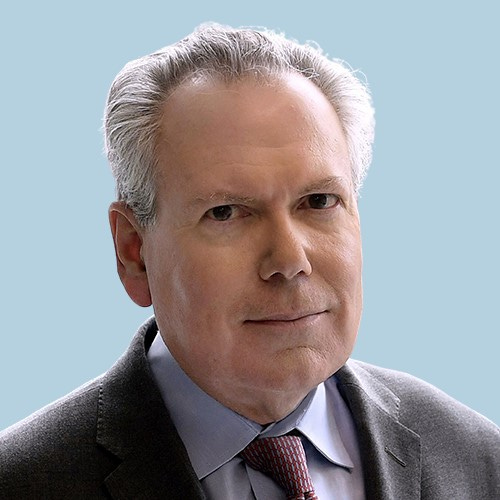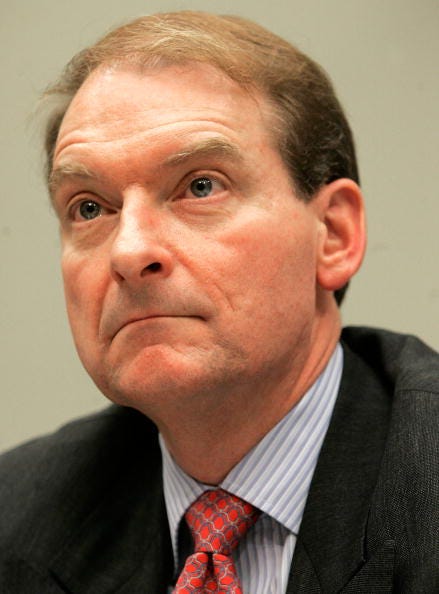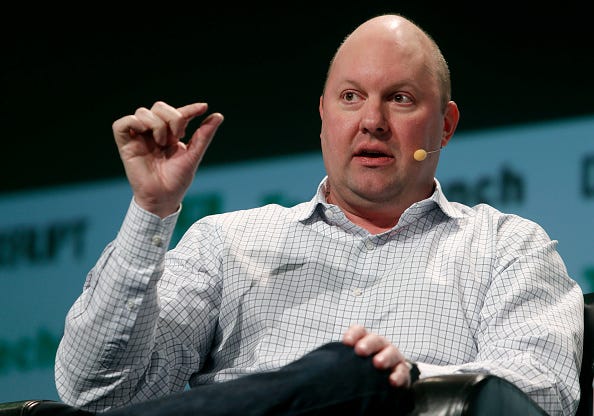A Wall Street Advocate on the Changing Regulatory Landscape; Atkins Pick Signals SEC Overhaul; Crypto Pushes Old Banking Issue to the Fore
Capitol Account: Free Weekly Edition
The president-elect began filling his roster of financial regulatory chiefs this week, starting at an agency that is sure to see that biggest course correction: the SEC. We had an in-depth report on Paul Atkins, a fixture in Washington’s conservative legal circles who has been very vocal about what what he thinks needs changing. He’s worked at the commission twice before and plans to hit the ground running. Finding a leader for the CFPB is proving a bit more difficult for the Trump transition. Interestingly enough, sources told us that one influential voice is open to keeping Rohit Chopra around for a while — J.D. Vance.
The digital assets world, flexing its post-election power, is quickly getting much more involved in the policy sphere. A new White House AI and crypto “czar” was rolled out this week. Not surprisingly, he’s a very successful venture capitalist and popular podcaster with ties to Elon Musk. Silicon Valley moguls are also pressing for action on an old issue that has been dear to Republicans — preventing banks from denying services to politically unfavored industries.
Wall Street is pretty happy about the changing oversight environment as well. For our Friday interview we sat down with a leading D.C. advocate for financial firms to get his take on what may be in store in the coming year.
Thanks for reading our digest of articles published this week. To get more stories like these in your inbox every weekday evening, click the button below to subscribe.
Friday Q and A: Though Donald Trump’s inauguration is more than a month away, the incoming administration’s plans for financial oversight have been slowly coming into focus. Thus far, the president-elect’s choices for the top posts at the Treasury Department and SEC have signaled an inclination toward unleashing market forces, rather than new regulations. Wall Street, of course, couldn’t be more pleased.
Looking for an insider’s view, we sat down recently with Kenneth Bentsen Jr., president of the Securities Industry and Financial Markets Association. His roots in both the business and Washington run deep. Bentsen was a Democratic House member from Texas, serving four terms. But he also worked as congressional staffer and an investment banker, specializing in municipal and housing finance.
Read on to learn Bentsen’s assessment of the Biden administration’s rulemaking efforts and his thoughts about what next year may bring, both at the agency level and on Capitol Hill. Hint: he’s not so sure that calling Trump’s nominees “pro-Wall Street” rings true. What follows is our (lightly edited and condensed) conversation.
Capitol Account: What does Sifma do?
Kenneth Bentsen Jr.: We're the trade association for the U.S. capital markets business. Our members are investment banks, broker-dealers and asset managers…We're not in the commercial or consumer banking area. We have members who are, but that's outside of our mandate.
CA: You’re often referred to as the largest Wall Street trade group.
KB: We represent north of 80 percent of broker-dealer market share in the U.S. And on the asset management side, I'd say our members comprise around 50 percent global [assets under management].
CA: So your lobbying agenda is big – and varied.
KB: We advocate in the federal and the state area, as well as with international standard setters. Advocacy is a big component of our business, but we do a tremendous amount of work in the operations space – market resiliency, [business continuity planning], cyber resiliency…We do a lot around the compliance space in working with our members on regulatory compliance, whether it's Finra, SEC, CFTC…And of course, like any other trade, we have a pretty robust conference business.
CA: How has government oversight of financial companies evolved since you’ve been on the job?
KB: When I joined Sifma 15 years ago, there was a little bit of a perception among some that New York was where it was at – Washington was just sort of an outpost….I was brought in to run the Washington office so maybe I had a bias here, [but] it's hard to say that Washington hasn't played a massive role with respect to the industry, at least going back to Dodd-Frank. I would argue before then. But at least since the financial crisis.
CA: The Biden regulators must have kept you pretty busy over the past four years.
KB: There was a heightened focus on the SEC because of Chair [Gary] Gensler and his agenda…There's been some fatigue with the volume and pace of rulemaking coming out of just the SEC. Then you add on that many of our members are impacted, either directly or indirectly, by the Basel III endgame. Then…the long-term debt [rule], the brokered deposits [proposal at the FDIC] – that's been an issue. We don't normally deal with the CFPB, but I'm aware they've been doing a lot of stuff too. I think people are trying to catch their breath.
CA: Trump has announced a few nominations that will have a lot of sway over finance. What’s your assessment?
KB: We don't, as a rule…endorse nominees. We don't think that's our role. We work with these agencies. They're very important for our members, in setting policy and in some cases, regulating our members.
CA: They’re not even nominees yet, of course. But any early thoughts about Scott Bessent who is the choice for Treasury secretary?
KB: I don't know him, but everything I have heard and read about him is incredibly impressive…He has grown up in the markets. He's really studied markets and economic history. He has a global perspective that is, for that role, very important.
CA: This week, the president-elect also selected Paul Atkins to run the SEC.
KB: I know Paul quite well. I think you would be hard-pressed to find someone with the level of qualifications and experience and understanding of the agency that Paul has – a former commissioner, former senior staff to two chairs…He's a person who is not going to have trouble finding his office the first day he goes there.
CA: Does it give your members comfort that the choices are seen as pro-Wall Street?
KB: They have a mandate, they have a remit and a responsibility – they work for the government…Their views are not always the same views as the industries they regulate. And people should have no illusions otherwise. History has always proven that out…What you want in those roles, in my view, are people who are smart and capable.
CA: So describing these selections as a win for financial firms is a bit simplistic?
KB: I think so. I'm sure there are people that would disagree with me on that, but these people we’ve talked about, Bessent and Atkins, they've been very successful in their careers. I'm sure they have their own views…It’s a false assumption to say they're always going to be aligned with one sector or another. They're going to come in and do the job the way they think that it should be done.
CA: There is a populist streak that runs through Trump world. Are you concerned that some of his regulators could be anti-big banks?
KB: There certainly has been in some respects, you might argue, almost a right-left axis on that – not liking large entities. Probably more focus in the tech world than our world, but our world sometimes gets that as well. I would just argue that the financial services sector, it's a hyper-competitive sector…We have new entrants into the business on a regular basis in the wealth management space. Our clients walk with their feet – and money – every day…(Friday)
Click here to subscribe and read the rest of the interview.
Thanks for reading. Follow us on X @CapitolAccount and on LinkedIn by clicking here. We’re always looking for stories, so if you have any suggestions on what we should cover (or comments about Capitol Account), shoot us a note. Rob can be reached at: rschmidt@capitolaccountdc.com and Ryan at rtracy@capitolaccountdc.com. If somebody forwarded this to you and you’d like to subscribe, click on the button below. Please email for information on our special rates for government employees, academics and groups: subscriptions@capitolaccountdc.com.
Ready to Roll: Atkins has been talking for years about overhauling the SEC. Now he’ll have the chance.
If confirmed to lead the securities regulator next year, the 66-year-old lawyer is planning to make sweeping changes, not only on policy but also to how the agency is managed and staffed. His agenda, which sources say is already in the works, is likely to be as ambitious as Gary Gensler’s – though in mirror image. Regulations will be repealed, rather than piled on. Crypto firms will be welcomed, instead of sued. Enforcement, in particular, will be reined in.
In his announcement, Trump called Atkins “a proven leader for common sense regulation” and emphasized that he “recognizes that digital assets and other innovations are crucial to Making America Greater than Ever Before.”
Once Atkins takes over, change could come fast. He previously worked at the agency for a decade, as both a commissioner and top staff member, so he won’t need much time to get up to speed. As his supporters like to underscore, Atkins knows where the bodies are buried – and where the recalcitrant bureaucrats are hiding.
Though he left the commission in 2008, Atkins has remained a constant presence in the securities law world. He’s been a go-to conservative witness at congressional hearings and a frequent speaker at industry conferences. His firm, Patomak Global Partners, provides consulting services to financial companies and is well-known as a sort of government in exile for former Republican regulatory officials.
Dan Gallagher, who worked for Atkins at both Patomak and the SEC, calls him “the absolute best choice” for the chairman job. “He’s brilliant, principled and tireless,” says Gallagher, now the chief legal officer at Robinhood Markets. “And he cares deeply about free markets.”
Notably, Atkins’ return would put him in a majority with two of his former aides: Hester Peirce and Mark Uyeda. The opportunity to work with proteges who share his ideology and enthusiasm for revamping the agency was a big reason Atkins agreed to return to the government, sources note. He’s told people that he trusts them both implicitly, knows their strengths and plans to delegate significant pieces of his portfolio to each. Peirce is likely to take a lead on digital assets, the sources say.
Atkins has ties to plenty of Democrats. While few agree with his de-regulatory ideas, most describe him as congenial, smart, willing to listen and not doctrinaire. In his first stint at the commission, Atkins worked for chairmen of both parties: Richard Breeden, appointed by George H.W. Bush, and Arthur Levitt, named by Bill Clinton.
Nevertheless, there was little comity at the SEC when Atkins was a commissioner during the George W. Bush administration. Much to his surprise and frustration, Atkins often found himself leading the opposition to his GOP colleague Chairman William Donaldson’s rules. Their relationship was so strained that Donaldson at times resorted to communicating with Atkins in writing.
Atkins also had a rocky time with some of the SEC’s career appointees during that time. Enforcement lawyers gave him the nickname “Commissioner No” because of his propensity to vote against their cases. He was a vocal critic of the division and took a stance against the huge surge in monetary penalties imposed for corporate wrongdoing at a time when accounting scandals were dominating the headlines. Atkins argued that the fines often harmed shareholders who had nothing to do with the frauds.
A few agency alumni who tangled with Atkins back then said they were surprised – and dismayed – by his appointment. “During my 31 years at the SEC, he was the most hated commissioner I can remember,” says John Britt, a retired enforcement attorney…(Wednesday)
Click here to subscribe and read the rest of the story.
Demanding Action: There’s a looming financial policy issue that energizes prominent Trump backers, and it’s not the Basel endgame, credit card fees or any of the other items on the banking industry’s deregulatory wish list. Instead it’s debanking, the idea that lenders are cutting off disfavored customers due to government pressure.
A who’s who of wealthy donors with close connections to the incoming president – from Elon Musk to venture capitalist Marc Andreessen to Coinbase CEO Brian Armstrong – have been spouting off about the problem. The growing uproar is teeing up the issue for early attention in the next administration, and there’s no guarantee banks will like the outcome.
Debanking, of course, has a long history as a (mostly) Republican bugaboo. Dating back to the Obama-era Operation Choke Point, banks have been accused of cutting off politically unpopular businesses, including payday lenders and gun manufacturers. For Trump, the issue is also personal: Melania Trump claims that she was denied the ability to open an account for their teenage son after the Jan. 6 storming of the Capitol. The president-elect told a campaign rally earlier this year that he wants action: “We’re also going to place strong protections to stop banks and regulators from trying to debank you.”
The more recent hubbub was sparked by Andreessen, who appeared last week on Joe Rogan’s podcast and accused the Biden administration of conducting an Operation Choke Point 2.0, aimed this time at crypto start-ups. “We’ve had 30 founders debanked in the last 4 years,” said the general partner at Andreessen Horowitz, which has an array of digital asset and fintech investments.
The Silicon Valley leader, who endorsed Trump this summer, cited the trend as a top reason behind his decision: “We can’t live in a world where somebody starts a company that is a completely legal thing and then they literally get sanctioned and embargoed by the United States government.” (Later in the conversation with Rogan, Andreessen not-so-subtly noted that he had spent a couple recent weeks “down in Florida,” i.e. near Mar-a-Lago.)
Musk, a fixture at the Trump Winter White House, quickly amplified Andreessen’s allegations on X. Coinbase’s Armstrong chimed in as well, calling the situation “one of the most unethical and un-American things that happened in the Biden administration” and alluding to his company’s ongoing FOIA lawsuit to get the FDIC to release documents related to its supervision of banks’ crypto activities. Even the Fed was pulled into the maelstrom, with the former head of the Libra project alleging that General Counsel Mark Van Der Weide personally leaned on banks to abandon Facebook-led the initiative in 2021.
While there is evidence of regulatory pressure causing banks to cut off customers in some cases, both executives and government officials have generally denied they are part of some deep-state conspiracy to target out-of-favor industries…(Tuesday)
Click here to subscribe and read the rest of the story.



